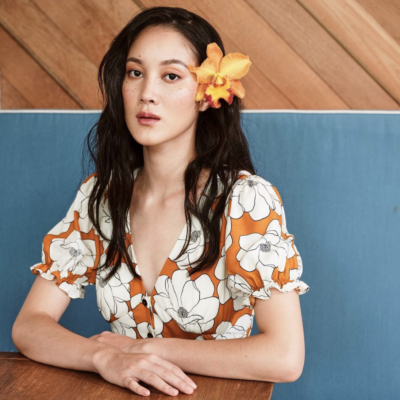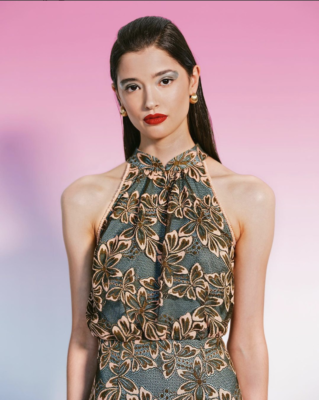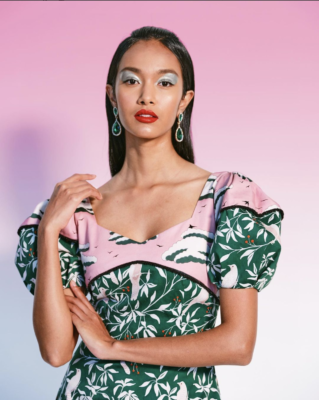Priscilla Shunmugam: Fashion Designer, Mentor, Disruptor
When you hear the term disruptor, you don’t immediately think of a lawyer-turned-fashion designer who has made colourful, print-astic modern cheongsams the “uniform” of choice for a niche set of Singapore fashionistas – but that’s exactly what designer Priscilla Shunmugam has done with her eponymous Ong Shunmugam brand: Disrupt.
Known for turning out elegant, iconic garments that are big on details with experimental accents, her modish-traditional aesthetic has remained timeless and culturally on point, surviving the ups and downs of Singapore’s fickle local fashion scene by continually evolving its silhouettes and choice of bold, eye-catching prints. Take for instance the Meena, the brand’s very first cheongsam issued in 2011, designed with kimono-like sleeves and a shorter mandarin collar, it’s entirely in vogue a decade on, as are all subsequent permutations.
Banking on the brand’s trademark cheongsams though was never the end game for the self-taught designer. With a creative process centered around bullet points rather than mood boards, her brand extensions have been particularly well-timed. In December 2019, she debuted a collection of ceramics produced in Bali called Tropicana, then there’s the casual, colourful diffusion OM line, and recently, Suvarnabumi, a collection of elevated Southeast Asian-inspired wood, porcelain, linen homewares, and rattan furniture handmade by a Malaysian-based craftsman.
Now, she’s adding one more accolade to her brand, kickstarting the Fashion Forward Bursary and Lasalle x Ong Shunmugam Mentorship Programme, an initiative to support Singapore’s next generation of fashion creatives. As part of it, Shunmugam holds critique sessions and consultations with students to “get their work evaluated using a very different eye [vs. their teachers] and from a slightly more commercial and practical angle.” She’s also pledged a total of $30,000 (disbursed as $10,000 per academic year from 2022 to 2024) which she eloquently puts in context: “We’re not giving away a huge amount of money, we’re giving what we can and what is feasible at this point of time. It goes hand in hand with the idea that, do you really need to be extremely wealthy to help others? Do you really need to have a lot of success before you can give?
Articulate, thoughtful, and well-spoken, Shunmugam shares more of her thoughts on issues surrounding Asian representation, racial stereotypes, and the cultural impact Ong Shunmugam has had on Singapore’s fashion industry.
*Answers have been edited for brevity and clarity

On Being A Mentor With Context
“The idea of having a mentor was something that I never grew up with. It was very foreign to me and by the time I realised you can have a mentor, it was too late. With regards to the creative industry in Singapore, there’s a lot of feeling around in the dark. There aren’t many positive examples to follow. I think of mentorship in a context, meaning a mentor who can understand what you’re going through, the background you come from, the tools that you’ve been given, your social, political, and economic surroundings, which is really important. If you have, for example, a mentor who came from a completely different upbringing, background country, of course, they will be able to help but I think it’s difficult to get under someone’s skin if you don’t understand where they’re really coming from. I do somehow have a soft spot for the creative students in Singapore because I think they just have it so much harder than anyone else and it’s so difficult to find that [a mentor] in the fashion, or a creative scene.”
On The Impact of Social Commerce
“Social media has turned a lot of industries upside down, and the fashion industry has definitely been upended by it. I always tell my staff (and anyone willing to listen) five years ago, when someone wanted to look for something they would Google it. Today, the first thing they do is search for it on Instagram. Any fashion brand that doesn’t understand that or chooses to downplay that does it to their detriment.”

On The Rise of Asian Representation
“It’s certainly nice to observe these changes happening, I think, especially in North America and maybe even the United Kingdom. I think there’s definitely a wider acceptance, just look at the recent success of Squid Game, and how her [the lead actress] physical beauty has been universally accepted by people of all backgrounds, races, and ethnicities – I couldn’t imagine that happening as little as five years ago. These changes are maybe very subtle to some people, but for others, these are actually quite big waves of change and they signify many other deeper shifts. For Asians, I think it signifies that we’ve stopped worrying so much about what the West thinks anymore. Once upon a time, we had some very fixed yardsticks [for aesthetics/fashion], for example, if you’re a woman and Asian, you would feel that if you didn’t have double eyelids, or if you didn’t have a very structured nose or coloured hair, that you were somewhat inferior, and you had to do something to fix that. I think you see more and more Asian women just embracing the way they are, and working with what they have. There are definitely positive changes going on, as someone who has always paid attention to these things I can only look and smile. It shows Asians, in general, are getting more confident and understanding themselves better.”
On The Ong Shunmugam Woman
“I think she’s someone who cares, who is curious and considered. I rarely think of her in terms of what she does for a living. I think of how she feels and thinks, how she spends her money and presents herself, what matters to her. Is she just concerned with the price point or does she care to ask where her clothes come from and what the brand stands for? It’s a personal point of view because that’s very much how I make my consumer decisions. It’s not just price or design for me, if I see something that’s cheap, but if I know that it’s a copy of some other brand, I won’t buy it. I will support the original brand. But you know, not everyone thinks that way, I just put it out there and hope for the best.”

On What The Brand Has Contributed
“It’s really hard for me to answer this question because I feel like I may be overstating or exaggerating things. It’s a question that’s best answered by our customers. But if it’s from my point of view, I definitely feel like we have contributed to widening the conversation and the scope of what to do. I think we definitely challenged, changed a lot of fixed notions. We’re the only brand that will sell a Chinese New Year collection using a black or brown skin model. No other brand will do that. When a customer makes an appointment and comes to the shop, she is served by either myself (who is of mixed heritage) or my staff, who are not Chinese. I think sometimes people may overlook little decisions like this, but I can tell you that for us to achieve the kind of success and revenues that we do with a customer base who is 90-95 percent ethnically Chinese is not something that I take for granted. The credit has to be given to the customers who come to us year on year, they spend good money and support everything we do, and not once question if we’re giving them a less than authentic experience. I think it’s important to realise we live in times where race, ethnic boundaries, and preconceived ideas still run deep within us. So when these things happen, I never downplay them. I always remind my staff and my team, how important it is that we’re able to do this. And yeah, I think that sometimes those things are the most powerful achievements that we have.”
To find out more about Ong Shunmugam, visit ongshunmugam.com.
This article Priscilla Shunmugam: Fashion Designer, Mentor, Disruptor appeared first on Popspoken.
